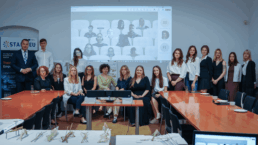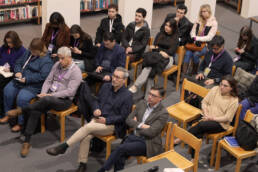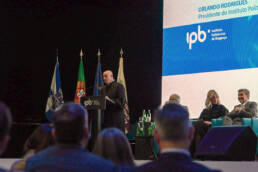The first edition of the BIP FutureLab Camp ended just a few days ago with the presentation of a range of concrete solutions in the fields of urban development, infrastructure, identity and promotion for the city of Zakliczyn (Poland). The closing event was attended by 26 students from the Cracow University of Technology (Poland), Bragança Polytechnic University (Portugal), Marie et Louis Pasteur University (France) and Hanze University of Applied Sciences (the Netherlands) — members of STARS EU — as well as about a dozen academics and another European institutions.
The diversity of specialisms — architecture, computer science, management and art history — has been one of the key assets of this Blended Intensive Programme (BIP), which started in the first quarter of 2025 (in person) and continued until June (online).
Using posters and panels, the students (in person and online) presented three specific urban concepts for Zakliczyn that promote local development and boost the expansion of tourism in the area, which is home to resources such as the Dunajec River, Zakliczyn Market Square, examples of sacral architecture, the ruins of Melsztyn Castle and the Krzysztof Penderecki European Music Centre in Lusławice.
Students’ proposals
Some of the suggestions put forward by the students highlight ideas for the pedestrian bridge, with visualisations and physical models, the design of a new website and possible internet infrastructure solutions intended for tourists visiting Zakliczyn. Alongside these contributions, the marketing plan designed for the municipality, a key result of this BIP, is a very important document: a total of 130 pages encapsulating exhaustive analysis and original ideas to showcase the potential of this charming city.
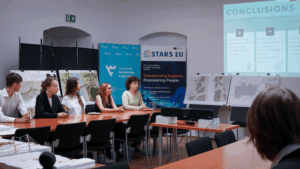 The concepts proposed by the students received praise from the Mayor of Zakliczyn, Dawid Chrobak. “The collaboration between Zakliczyn and Cracow University of Technology began with the idea of designing a pedestrian and bicycle bridge over the Dunajec River, connecting the castle ruins in Melsztyn to Zakliczyn. That was the starting point. However, the students developed extensive, professional marketing and urban planning documents that go far beyond the initial goal of enhancing the tourism potential of Zakliczyn and nearby towns. We plan to present the results — i.e., the concepts of the bridge and public spaces — to the local council and community,” said Mayor Chrobak.
The concepts proposed by the students received praise from the Mayor of Zakliczyn, Dawid Chrobak. “The collaboration between Zakliczyn and Cracow University of Technology began with the idea of designing a pedestrian and bicycle bridge over the Dunajec River, connecting the castle ruins in Melsztyn to Zakliczyn. That was the starting point. However, the students developed extensive, professional marketing and urban planning documents that go far beyond the initial goal of enhancing the tourism potential of Zakliczyn and nearby towns. We plan to present the results — i.e., the concepts of the bridge and public spaces — to the local council and community,” said Mayor Chrobak.
Evaluation by the authorities
At the event, which took place in the Faculty of Architecture, the “high quality” of the work carried out by the architecture students of CUT, as well as their fellow students from the partner universities, was highlighted. The students worked on urban solutions aimed at uncovering the identity of a small but beautiful town with a rich past, outstanding cultural heritage and a strong musical tradition, particularly in the context of the Krzysztof Penderecki European Music Centre.
The architectural task consisted of designing a bridge to connect Zakliczyn with Melsztyn Castle. The students from the University of Bragança developed marketing strategies, with spatio-temporal solutions based on a city game, explained the academic supervisor, Dr hab. inż. arch. Kinga Racoń-Leja, Prof. PK.
The Mayor of Zakliczyn stated that the suggested proposals will be implemented in the city and stressed “the enormous professionalism” of the students’ work, who, as supervisors involved in developing these concepts, will present their results to the authorities and the local community in the coming months.
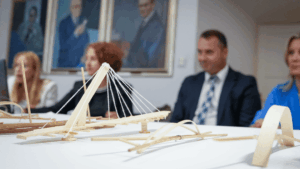
For her part, the Vice-Rector, Dr hab. inż. Katarzyna Bizon, expressed her satisfaction with the result shown by the groups of students in their final presentations, filled with great creativity, and with the successful conclusion of an international collaboration project such as FutureLab.
An innovative pedagogical model
FutureLab Camp is not the first of the international educational projects in which students from CUT’s Faculty of Architecture are involved, within the framework of STARS EU. As part of the Thematic Interest Group (TIG) Living Spaces, these workshops have been underway regularly since last year, thereby boosting the internationalisation of the education process.
“This kind of project is filled with pedagogical value, but it also poses a challenge, both for the students and for the professors, as it requires considerable effort, collaboration in other languages and with groups from different cultures, and the ability to provide solutions that are relevant to external stakeholders,” stressed Dr inż. arch. Ernestyna Szpakowska-Loranc. The expert also explained that this edition presented an even greater challenge, as the work was carried out in interdisciplinary groups.
Future editions: France and Portugal
The agreements reached in STARS EU guarantee the continuity of this Blended Intensive Programme. The next meetings will take place in France in 2026 and in Portugal in 2027. “We have been working for months alongside our partners on the framework for the next edition, based on the experiences of Kraków and Zakliczyn, where we have demonstrated that working in interdisciplinary and international groups is effective and brings tangible benefits to all involved,” said Adam Sadło, leader of Task 2.5 in STARS EU.
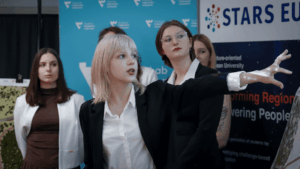
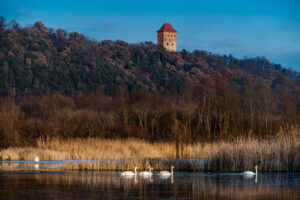
*The student selection process of the next edition will begin in June 2025 at all STARS EU universities.
Related Posts
February 28, 2026
In2CoP 2026 strengthens co-creation and innovation in higher education within STARS EU
With 60+ prototypes and three award winners, the event generated initiatives…
February 27, 2026
STARS EU convenes an online workshop on Digital Transformation for students
The call, which will be held on 12 June, is aimed at undergraduate, master's…
February 10, 2026
STARS EU partner IPB celebrates 43 years of regional commitment and international cooperation
The formal anniversary ceremony was held in Chaves (Portugal).

